|
Music Is The Healing Force Of The Universe The Inconsistency of |
|
|
||||||||||||||||
|
News from 2016 - July to August
July 1 2016
Albert Ayler Award As mentioned last month, the first “Albert Ayler Award”, sponsored by Steve Tintweiss, was presented at the Graduation Ceremony of the Aaron Copland School of Music at Queens College, New York on 2nd June, 2016. Steve sent me the following information about the event, including a photo of himself with the winner, Victor Murillo (Steve’s the one in the hat): ‘On June 2nd the graduation ceremonies for Queens College of the City University of New York took place. The Aaron Copland School of Music hosted separate presentations at LeFrak Concert Hall. The inaugural Albert Ayler Award was established and funded by bassist-composer and QC alumnus Steve Tintweiss for each Master of Music graduating class for the next eighteen years. Each $400 merit prize award is bestowed upon an outstanding graduating student musician completing the Performance or Composition major in the Master of Music in Jazz Studies program who “best exemplifies the aesthetic and techniques that were fostered, developed and showcased in the music and playing of Albert Ayler (1936-1970)”. The primary criteria the faculty selection panel considers are: 1. Instrumental Ability - technical excellence with a focus on expressivity and originality 2. Outstanding Improvisation Ability outside of mainstream bebop and post-bebop forms exploring open free form improvisation 3. Writing Ability - original scores, lead sheets, arranging, original tunes annotated or recorded 4. Band Leading Ability with knowledge of technical theatrical production and media promotion a plus. The first Albert Ayler Award in Jazz was presented to Victor Murillo, a bassist studying with David Wong (Roy Haynes “Fountain of Youth”, and the Heath Brothers Quartet). See reception photos of certificate with Victor and Ayler bassist Steve Tintweiss. Happy 80th Birthday in memory of Albert Ayler.
The Aaron Copland School of Music Master of Music in Jazz Studies academic requirements and application procedures can be found at links: http://qcpages.qc.cuny.edu/music/prospective/apply http://qcpages.qc.cuny.edu/music/prospective/JAZZ%20DEPARTMENT%20FAQs.pdf Best Wishes, Steve Tintweiss’ |
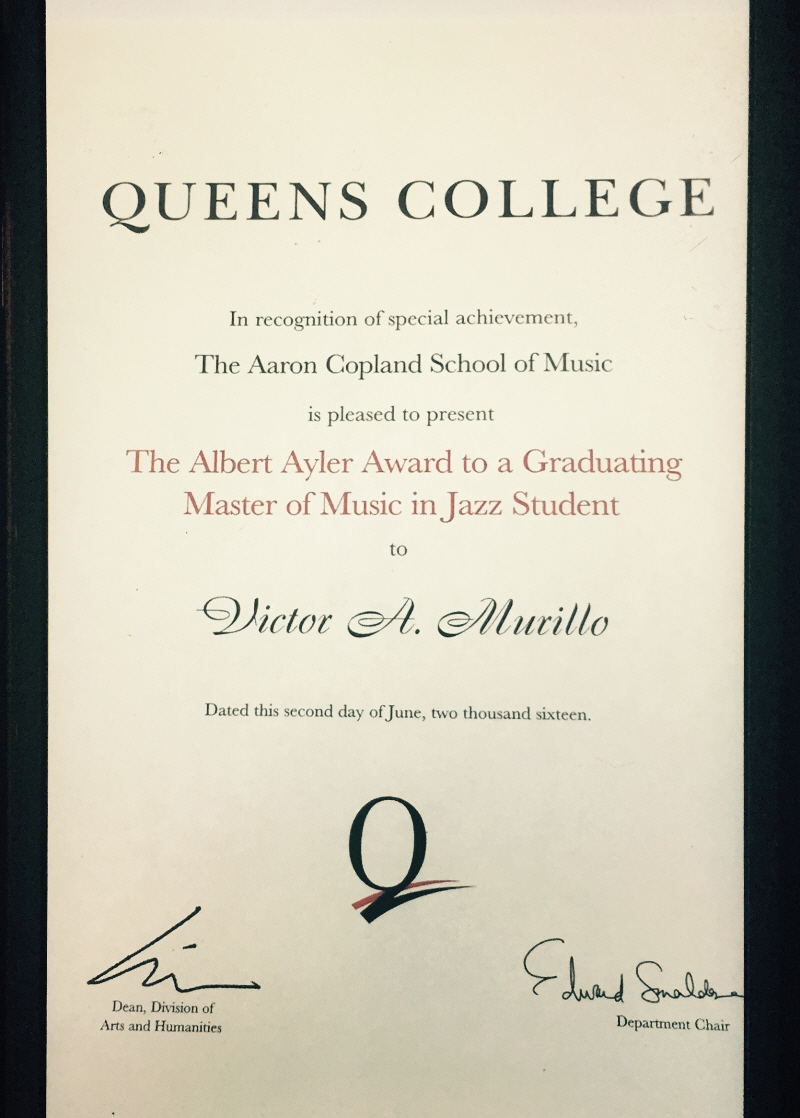 |
||||||||||||
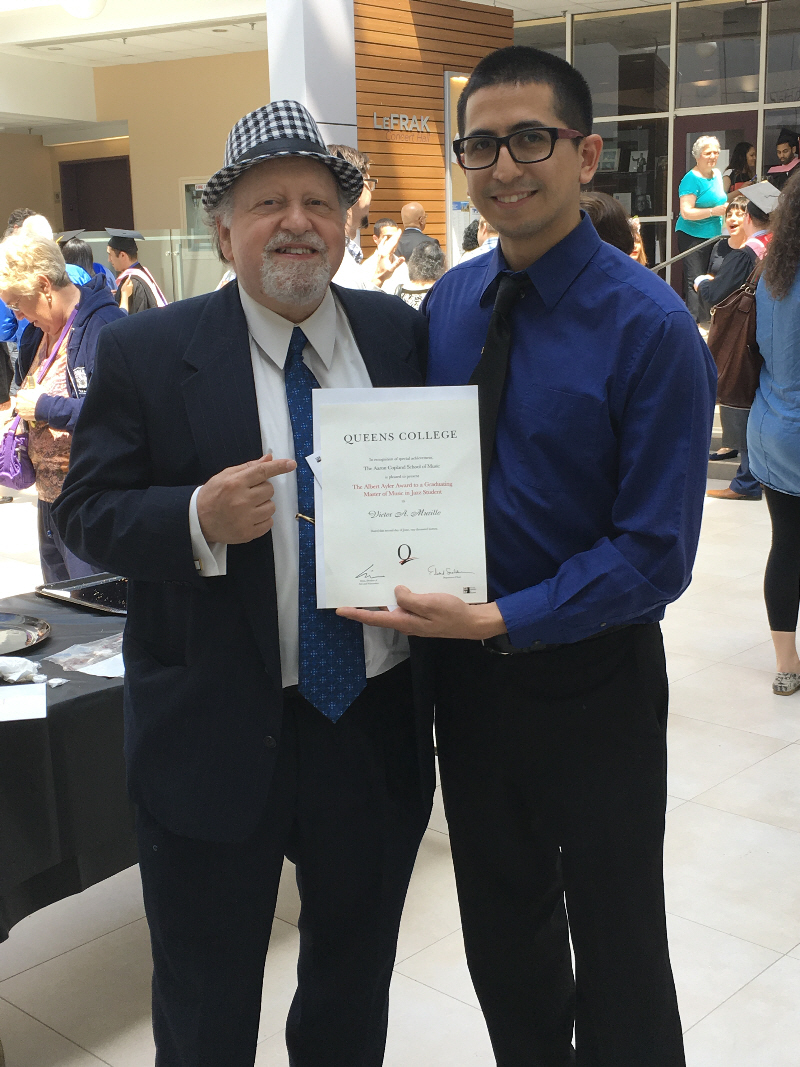 |
||||||||||||
|
Congratulations to Victor Murillo and to Steve! * Barry Seroff Searching the website of the Aaron Copland School of Music for mentions of Ayler, I came across this from a list of concerts given in March, 2006: ‘March 14, 2006 7.30 pm: Graduate Composers' Concert. Second Instrumental Unit. Patricia Giannattasio, Trio Para Violin, Cello y Piano, Takuma Tanikawa, Orange, Maria Mykolenko, Shattered Glass, Barry Seroff, For Albert Ayler, Dave Volpe, Mad Dance, Lisa Hogan, Three Pieces for Piano, Gennady Yusim, Dialogue for Violin and Cello, Spencer Koenig, Golden Affinity, Glauco Sagebin, Piano Trio No. 1.’ Barry Seroff’s ‘For Albert Ayler’ is available here, and I’m assuming this is Barry Seroff’s facebook page. * Festivals One past, one future. The New Ghosts group in Cleveland organised an AylerFest 2016 last month which featured the groups, Universal Indians (with Joe McPhee) at The Bop Stop on 16th June, and Witches & Devils, led by Mars Williams, at The Happy Dog on 18th June. |
||||||||||||
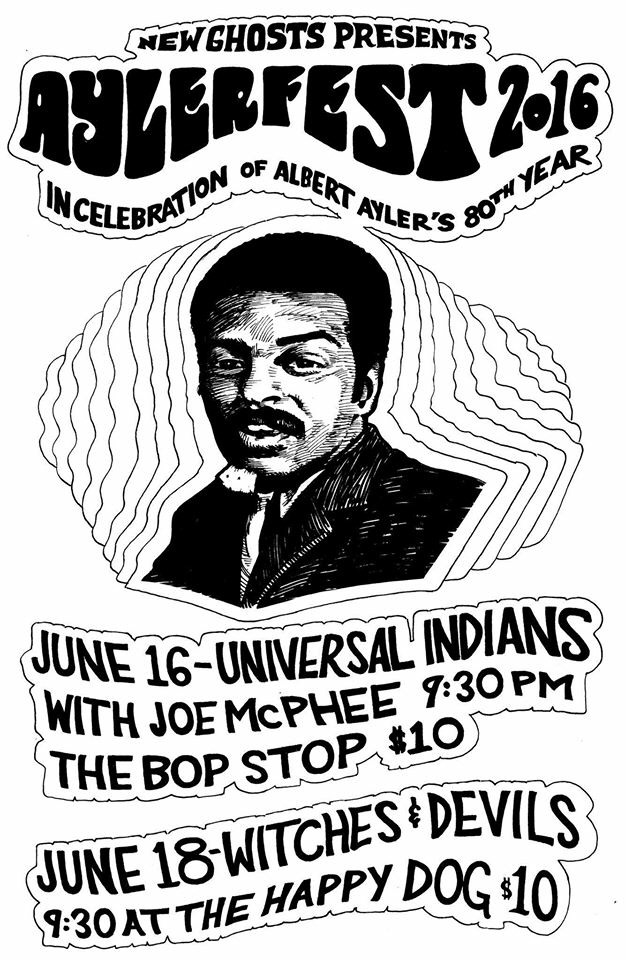 |
||||||||||||
|
And the Montclair Jazz Festival (which takes place in New Jersey in August) has chosen a painting by Andres Chaparro entitled, ‘Albert Ayler’s Cry’, for its posters, programmes, t-shirts and other festival merchandise. |
||||||||||||
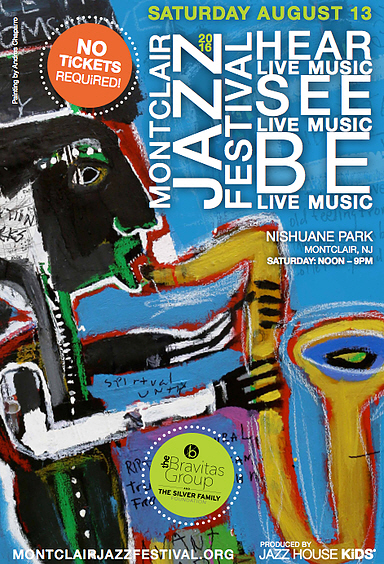 |
||||||||||||
|
More information about Andres Chaparro is available in this article and on his website and here’s the painting without the festival details: |
||||||||||||
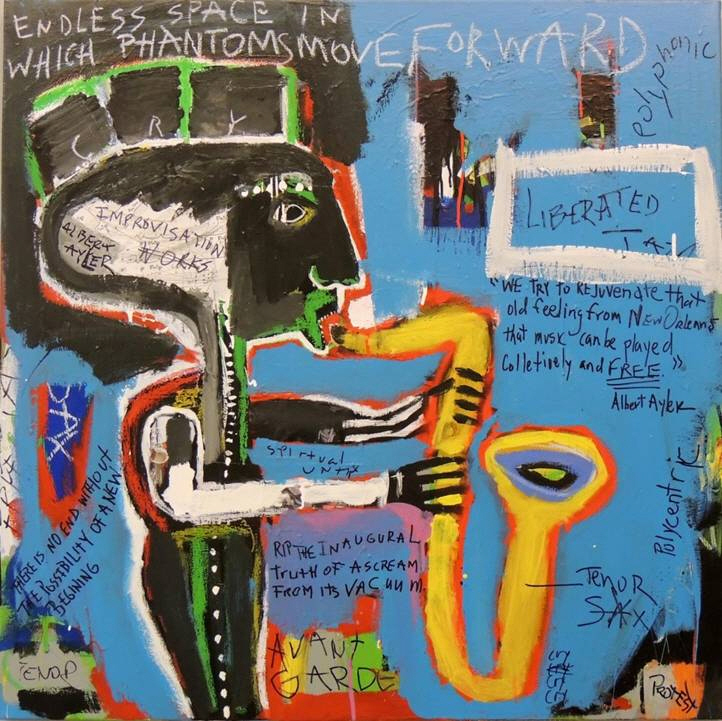 |
||||||||||||
|
Record News There’s a review by Mark Corroto of two recent Ayler releases - ESP’s Bells & Prophecy: Expanded Edition (ESP 4076) and Hathut’s European Radio Studio Recordings 1964 (hatOLOGY 678) - on the All About Jazz site under the title, ‘Albert We Hardly Knew Ye’. And Hathut have another Ayler release in the pipeline. According to the Upcoming Releases page on the Hathut site, hatOLOGY 694 is listed as ‘Albert Ayler Quartet - Copenhagen Live 1964’. Presumably this will contain the remaining tracks from The Copenhagen Tapes recorded live at the Club Montmartre, Copenhagen on 3rd September 1964 - a session which was also included in the Holy Ghost box set. Since both those releases have slipped out of the catalogue, Hathut should be congratulated for making this music available again. I have to thank Ernst Nebhuth for letting me know about the above upcoming release, and thanks also to Dirk Goedeking for these pictures of the back covers of the vinyl releases of both volumes of The First Recordings on the Jeanne Dielman label - “ou sont les sleevenote writers d’antan?” |
||||||||||||
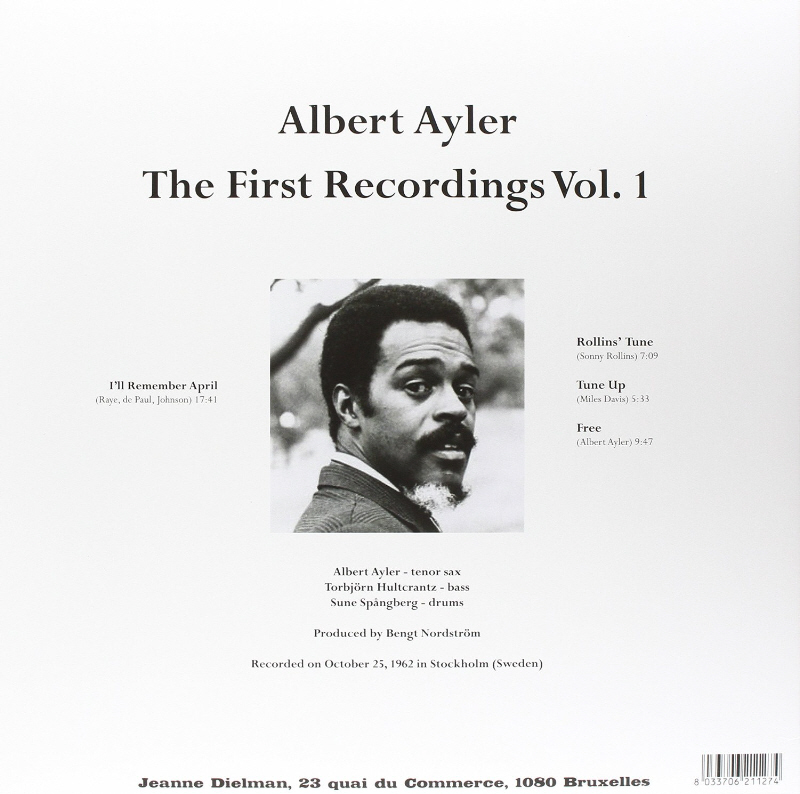 |
||||||||||||
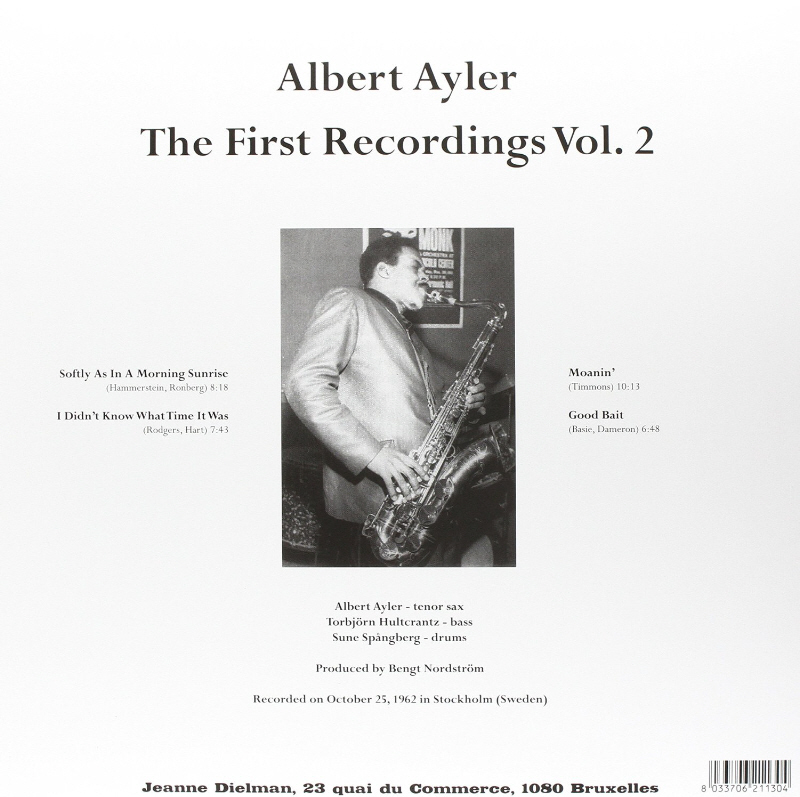 |
||||||||||||
|
Dirk also turned up two more mp3 versions of Ayler records. Unlike the others with the weird titles which were copies of My Name Is Albert Ayler, these two combine that album with Something Different!!!!! (aka volume one of The First Recordings). As Dirk says, “these two at least use a photo of him.” |
||||||||||||
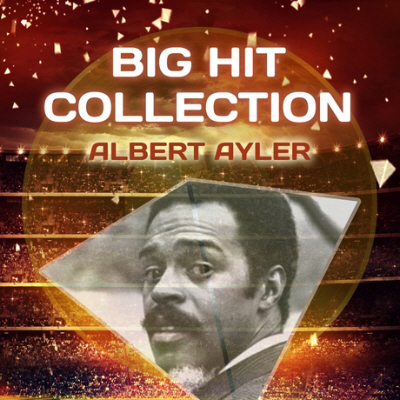 |
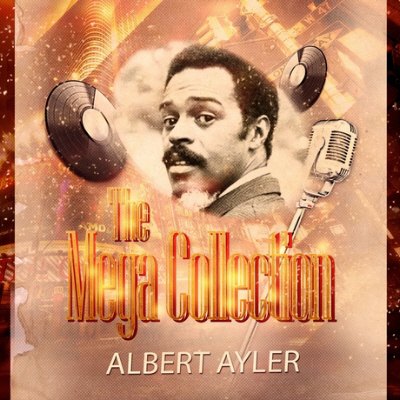 |
|||||||||||
|
In Greenwich Village But the most fascinating thing Dirk Goedeking came across on ebay is this handbill for Albert Ayler’s concert at the Village Theatre in 25th February, 1967 which eventually provided 8 tracks for Live In Greenwich Village: The Complete Impulse Recordings. |
||||||||||||
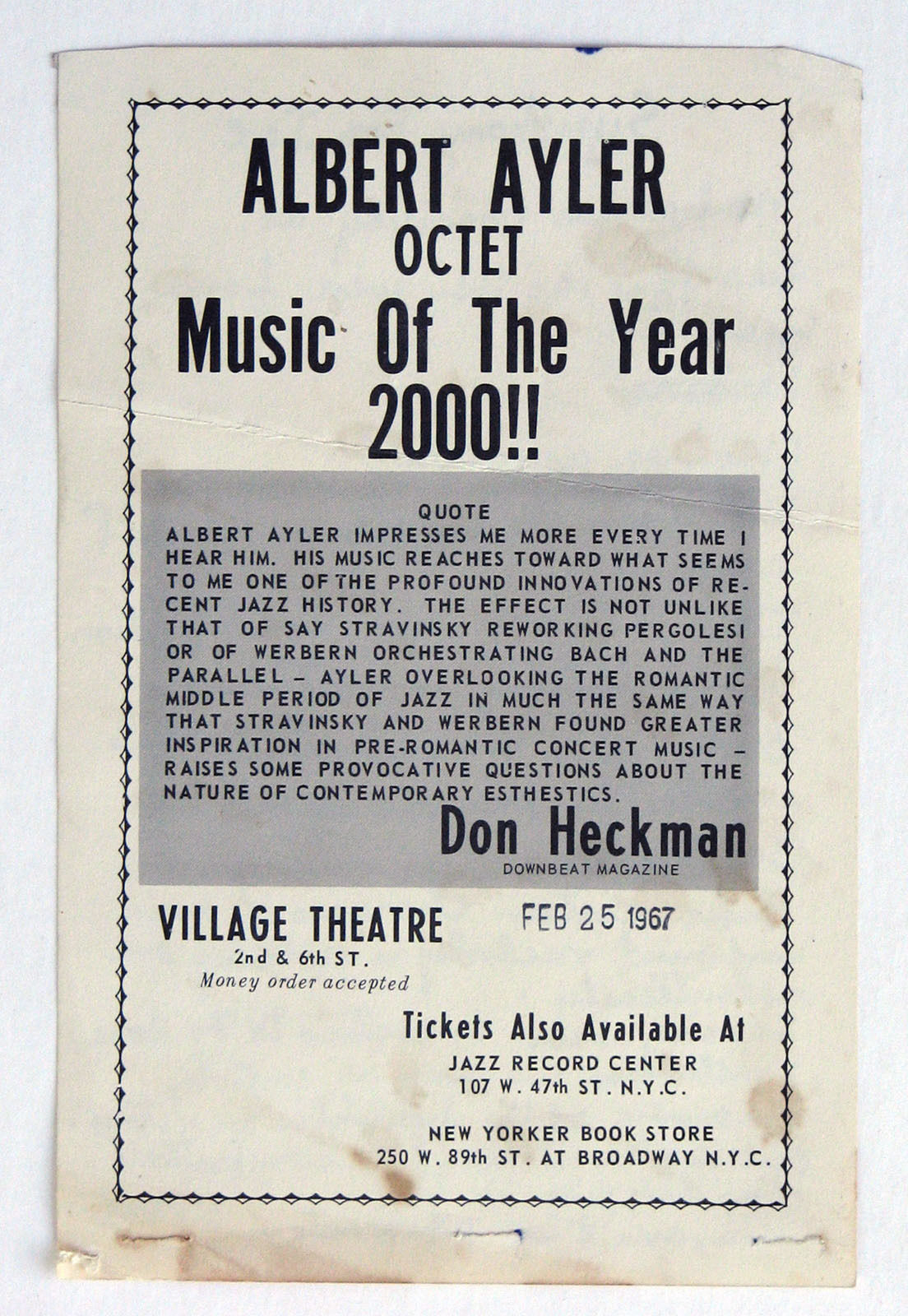 |
|
And on the other side of the handbill there’s this poem. |
|||||||||||||
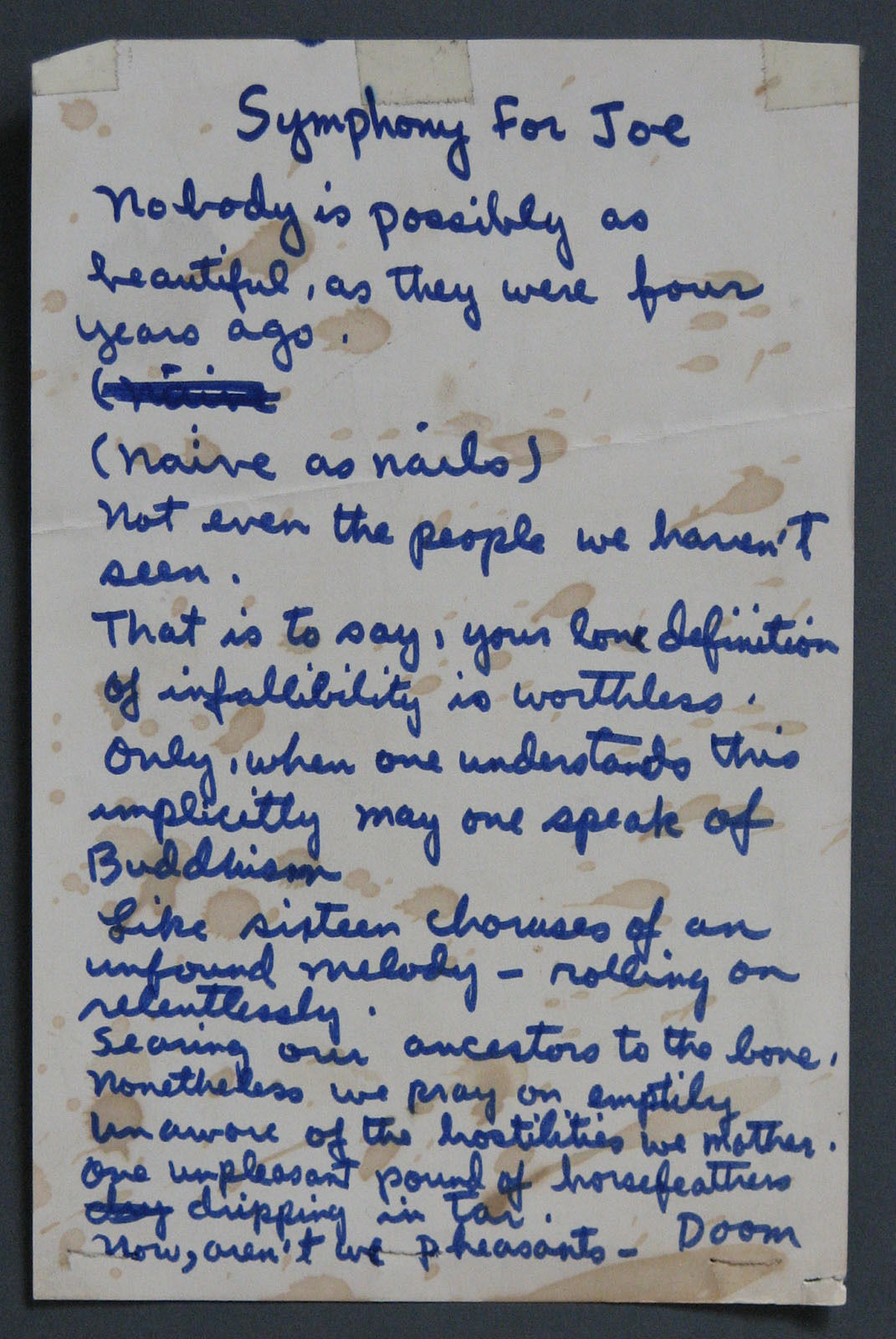 |
|||||||||||||
|
Henry Grimes On June 7th at this year’s Vision Festival in New York, Henry Grimes was honoured with a Lifetime Achievement award. The following is from Bill Milkowski’s ‘Notes From New York: A Jazz Column’ from Paste Monthly: ‘The Vision Festival, that gathering of musical renegades and avant garde aficionados that has both celebrated and defined the free jazz community in New York City for the past 21 years, had its annual week-long residency in June at the Judson Memorial Church, located in the heart of Greenwich Village, just off of Washington Square Park. The annual affair, which is produced by the non-profit Arts for Art organization, honors a significant figure who has made historic contributions to the music. This year’s honoree was bassist Henry Grimes, a ubiquitous session man during the 1960s who appeared on important albums by the likes of Sonny Rollins, Cecil Taylor, Don Cherry, Pharoah Sanders, Archie Shepp and Albert Ayler before completely dropping off the scene in 1970, only to be rediscovered in 2002 in Los Angeles, where he was living in a tiny apartment and doing odd jobs to support himself. Bassist-composer Williams Parker, one of the forces behind the Vision Festival, along with his wife, dancer-choreographer Patricia Nicholson, was a key factor in Grimes’ return to the scene. He not only donated a double bass (nicknamed “Olive Oil” for its distinctive green color) to Grimes but he also provided him with a showcase at the 2003 Vision Festival, a widely covered event which effectively jump-started Grimes’ career. The bassist has been a fixture at the free jazz bash ever since, performing on double bass, violin and reciting poetry. His Lifetime Achievement Award, presented on opening day of this year’s Vision Festival, is richly deserved. Grimes led a quartet with pianist Geri Allen, cornetist Graham Haynes and drummer Andrew Cyrille and also performed with a septet featuring guitarist Marc Ribot and drummer Chad Taylor. Other notable sets at this year’s Vision Festival included a 60th anniversary celebration by the Sun Ra Arkestra, led by 92-year-old alto sax master Marshall Allen, an experimental set by trumpeter Wadada Leo Smith, who performed with four violas and electronics provocateur Hardedge, and a powerhouse set by the perennial fest favorite Kidd Jordan, the 81-year-old New Orleans tenor sax titan and Albert Ayler disciple who performed with his longtime drummer Alvin Fielder and his trumpeter son Marlon Jordan.’ * Point of Departure And the latest issue of Point of Departure features an in-depth review of Barbara Frenz’s Music to Silence to Music: A Biography of Henry Grimes by none other than that frequent contributor to this site, Pierre Crépon. And I should also mention Stuart Broomer’s column in the same issue on the subject of the relationship between ‘roots music’ and free jazz, which concludes with a section on Albert Ayler and a glowing review of the recent release from the Brooklyn Blowhards which mixes sea shanties with Ayler.
|
|||||||||||||
|
* And a final note to say that the news from April to June, 2016 has now disappeared into the Archives. However, I thought I should mention that there are two particular articles on that page which deserve a reminder here: the interview with Michel Samson by Rudie Kagie from the Dutch magazine, Jazz Bulletin (June 2012) and Bert Vuijsje’s account from Vrij Nederland (5 December 1964) of the recording session which resulted in The Hilversum Session. Both were translated by Kees Hazevoet into English. And if you don’t want to wade through the News page, the Samson interview is also available in the Interviews section, and the Hilversum piece is in the Articles. Oh, and if you are unfortunate enough to live in the Disunited Kingdom, remember that Albert Ayler would have been 80 on the 13th of July. So, raise a glass, put ‘Change Has Come’ on the turntable/CD player/ipod thingy, turn the volume up as far as it will go, and wonder what the hell went wrong.# *** July 8 2016
Mystic Tenor On July 13th (which would have been Albert Ayler’s 80th birthday) there’s an event at the DIY Space for London featuring a rare showing of Michael Snow’s film, New York Eye & Ear Control and also Kasper Collin’s documentary, My Name Is Albert Ayler. Music will be provided by The Custodians of the Realm (Adrian Northover - saxes/electronics, Adam Bohman - amplified objects/strings, Thodoris Ziarkas - double bass, Dave Tucker - guitar/effects and Sue Lynch - tenor sax). More details available on the DIY Space For London site, and here’s the poster: |
|||||||||||||
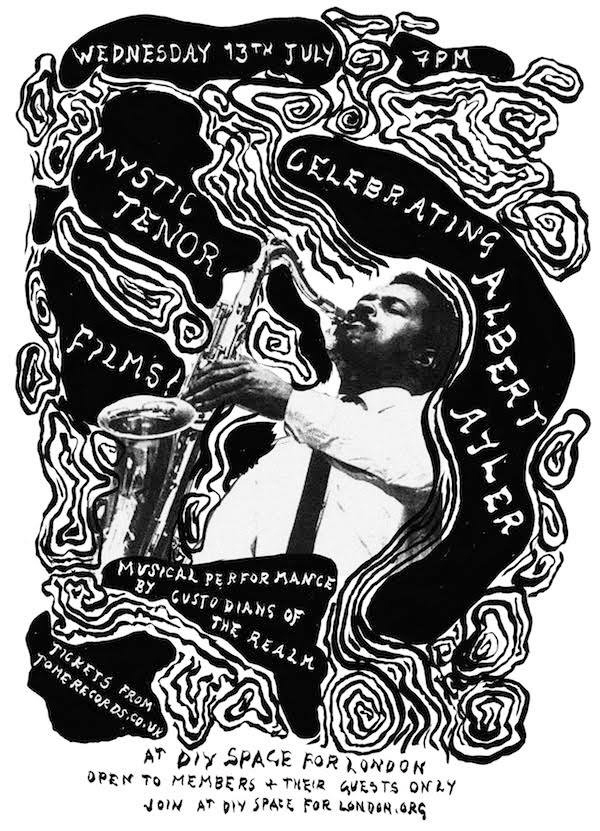 |
|||||||||||||
|
Ayler 80th on the Radio And on Wednesday, 13th July, WKCR in New York will be broadcasting a programme hosted by Jeff Lederer (of the Brooklyn Blowhards) devoted to Albert Ayler. Jeff’s guest will be Steve Tintweiss, who, as well as discussing the Fondation Maeght concerts, will also be playing some unreleased material of Albert’s stage announcements. *** August 1 2016
New Reissues - Sonny’s Time Now & Ghosts As mentioned a couple of months ago, Sonny’s Time Now (CD and vinyl) and Ghosts (CD) have been reissued on the Skokiaan label. The only information I’ve found about Skokiaan (apart from it being the title of a popular African song from the 1950s) is the following description of the label on the Discogs site: “Skokiaan is a label of unknown origin re-issuing unlicensed recordings allegedly under the aegis of Public Domain, claiming their releases to be manufactured in Europe, whether or not they are indeed manufactured in Europe is also unknown.” So, it would seem that these are not ‘official’ releases, licensed by Sunny Murray or, in the case of Ghosts, the Ayler estate, but are similar to those packages of old jazz albums which take advantage of the European copyright law on sound recordings, which differs from that which applies in America. It used to be straightforward - once an LP was fifty years old it was out of copyright and any company could then release it. Now, it’s more confusing (I think I’ve mentioned this before but it’s worth repeating). The following extracts are from the U.K. Government’s site:
“2. How long copyright in sound recordings lasts The length of term of copyright in a sound recording depends on whether or not it has been published (released) or has been communicated to the public (for example, played on the radio) if a recording is not published or communicated to the public, copyright lasts for 50 years from when the recording was made 4. EU Directive 2011/77/EU In September 2011 the EU approved a directive which extended the period of protection from 50 to 70 years for copyright and performers` rights in most published sound recordings. This change came into effect in the UK on 1 November 2013. The extension of the term of protection applies only to those sound recordings that were in copyright on 1 November 2013 and to any sound recordings made after that date. The extended period of protection does not apply to those sound recordings where copyright has already expired.” As far as I can make it out, the European Directive seems to imply that any LP issued before 1st November, 1963 is now in the Public Domain - as far as the U.K. and Europe is concerned. Anything issued after that date remains in copyright for 70 years. Ghosts was recorded in September 1964 and was presumably released some time in 1965, Sonny’s Time Now was recorded around November, 1965 (although there’s some confusion about this date) and presumably appeared in 1966 (maybe later). So, it would seem that the only Ayler albums in the Public Domain are the two volumes of The First Recordings and My Name Is Albert Ayler. There are several companies issuing old jazz records, but they seem to be keeping to the November, 1963 cut-off date. Avid is probably the best in terms of packaging - you get the original sleevenotes and full details - and they have dipped their toe into the early avant-garde with a couple of new reissues by Steve Lacy and Paul Bley (which includes Jimmy Giuffre’s ‘Fusion’ LP from 1961). However, the drawback with the Avid CDs is that they tend to contain four albums, and once you’ve bought one, you’ll find the company that produces the ‘7 Classic Albums’ series adding another three titles, and if you go with them (no sleevenotes but full personnel and recording details), then the other company that produces the big boxes of ‘Complete Recordings’ add another five titles (but with no information whatsoever). As always, it’s a case of caveat emptor. Still, sorry to go on at such length, I seem to be in a rambling mood (which will get worse, just wait till we get to Moby Dick). In the meantime, here’s the sleeves for the new Skokiaan reissues, for which I have to thank Dirk Goedeking and Ernst Nebhuth. Ghosts - Skokiaan SKOK001-CD |
|||||||||||||
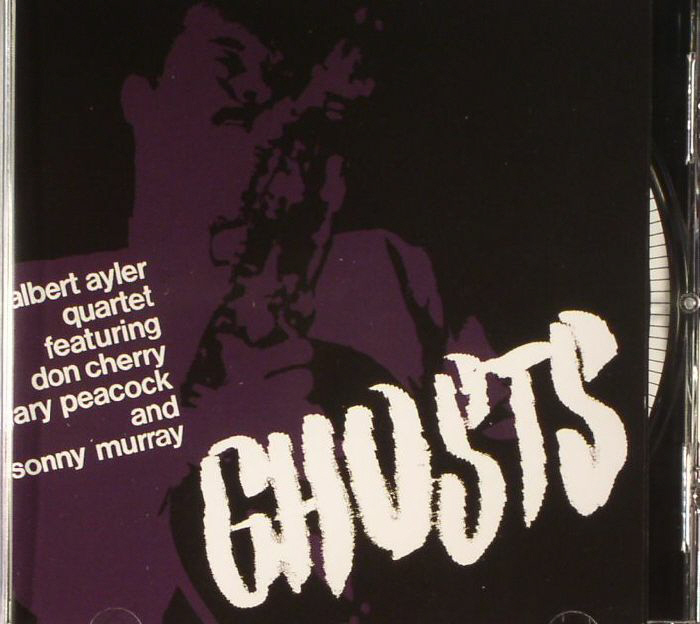 |
|||||||||||||
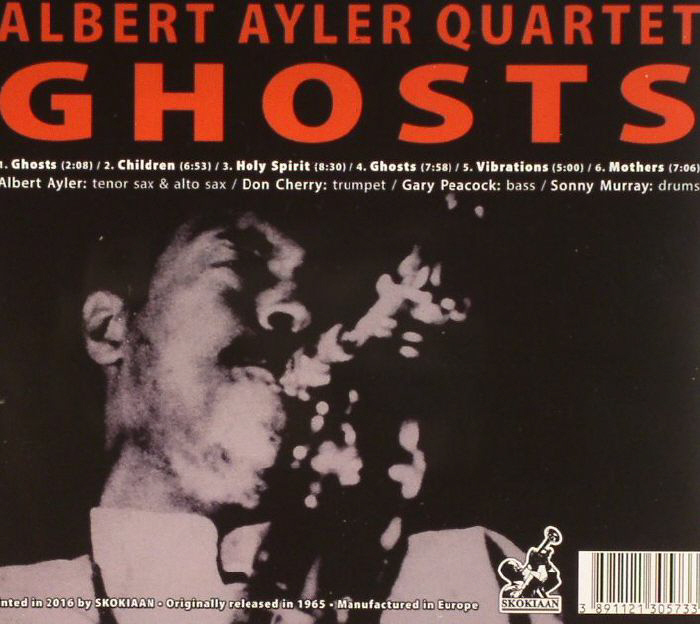 |
|||||||||||||
|
Sonny’s Time Now - Skokiaan SKOK005-LP |
|||||||||||||
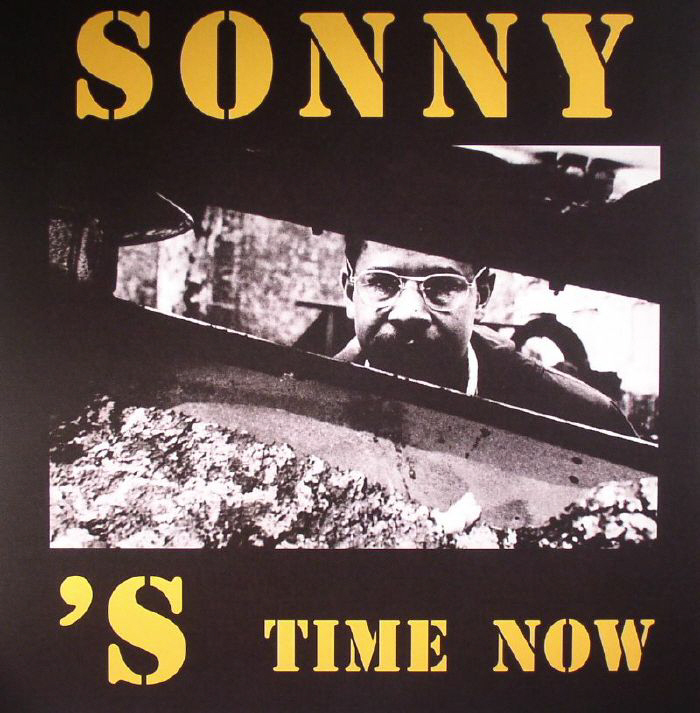 |
|||||||||||||
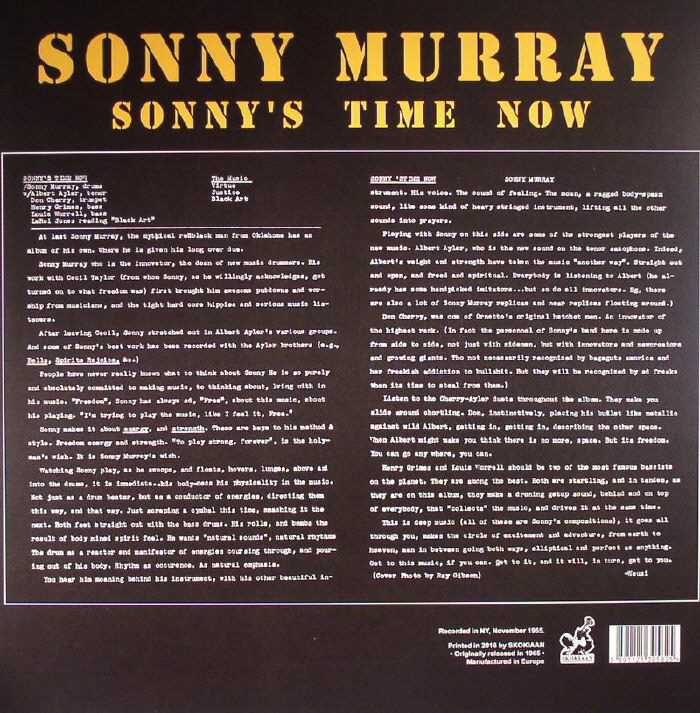 |
|||||||||||||
|
Sonny’s Time Now - Skokiaan SKOK005-CD |
|||||||||||||
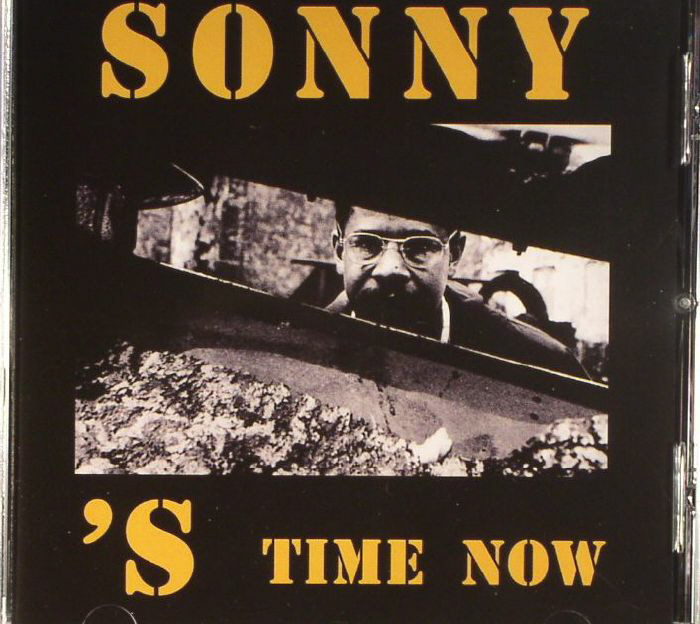 |
|||||||||||||
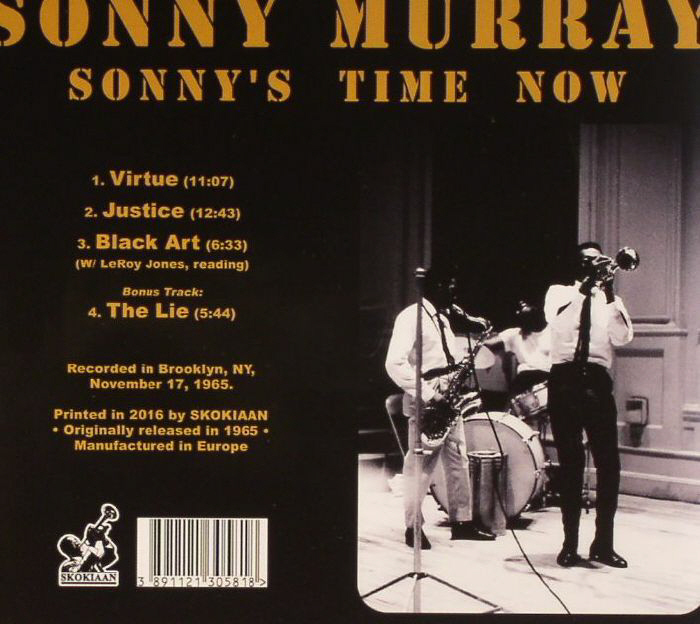 |
|||||||||||||
|
Sorry, I haven’t finished yet. So, Ghosts goes with the original Debut cover, and, according to Discogs, the sleevenotes are by Erik Weidemann (presumably the same as on the original release - available on the Ghosts Covers page). The vinyl release of Sonny’s Time Now replaces the original blank, black, back cover with the duplicated insert from the Jihad release (available on the Sonny’s Time Now Covers page). The photograph on the back cover of the Sonny’s Time Now CD was taken by Guy Kopelowicz at the Judson Hall session for Spirits Rejoice and is available in the Photos section of this site, along with Guy’s other photos from that session - I wonder if Skokiaan paid him? Which raises those murky questions of morality and ethics, which I don’t really want to get into here. Except to say that, I have no problem with Ghosts, which hasn’t been available on CD for years, but the fact that Sunny Murray is still alive, and licensed that strange Croatian compilation, ‘Sunny’s Time Now & More’, which I mentioned back in April, does bother me a little. On the other hand that version only includes the three tracks from the original Jihad LP, not the subsequent Japanese addition of the fourth track, ‘The Lie’. Well, that’s one for the Jesuits to work out - or Jiminy Cricket. And a final note - when Sonny’s Time Now eventually made it to the U.K. it was reviewed in Jazz Monthly by Max Harrison, who took exception to Leroi Jones’ (as he was then) performance of his poem, ‘Black Art’. This kicked off a minor controversy in the pages of the magazine and I’ve now added those pages to the site. The ‘discussion’ was not directly related to Albert Ayler, but it does give an idea of the British perceptions of ‘free jazz’ at the time: Pages from Jazz Monthly relating to Sonny’s Time Now * Steve Tintweiss on the WKCR Albert Ayler Birthday Broadcast On 13th July WKCR devoted nine hours of programming to Albert Ayler, to commemorate his 80th birthday. It culminated in an edition of ‘The Musician’s Show’ which featured an interview with Steve Tintweiss. These are the extracts from that interview: Steve Tintweiss Interview Part 1 Steve Tintweiss Interview Part 2 Mary Maria and Albert Ayler thank the Fondation Maeght audience * Moby Dick Jeff Lederer of the Ayler sea shanties group, the Brooklyn Blowhards, also contributed to WKCR’s ‘Albert Ayler Birthday Broadcast’ and I came across a couple of interviews in which he talks about Ayler and explains the reasons for his particular approach to his music: one is on the Park Slope Stoop site, the other in The New York Times. The latter includes a photo of the Brooklyn Blowhards playing in front of Herman Melville’s grave. And now you can skip to the next item. I spend most of my time working on another site about the forgotten Victorian writer, Robert Buchanan, and I do like it when my ‘enthusiasms’ collide. If you saw the recent Ron Howard film, In The Heart of the Sea, you’d be forgiven for thinking that when Ben Whishaw’s Herman Melville walks off into the sunset to write Moby Dick then all will be fine and dandy. However, when it appeared in 1851 Moby Dick was savaged by the critics and Melville drifted into a kind of semi-obscurity. In 1884 when Buchanan visited America he only wanted to meet with two American writers, Walt Whitman and Herman Melville. He succeeded in finding Whitman in Camden, New Jersey, but not Melville. When he returned to England the following year, Buchanan wrote a poem about his meeting with Whitman and included a verse about Melville, with this footnote: “Hermann Melville, author of Typee, The White Whale, &c. I sought everywhere for this Triton, who is still living somewhere in New York. No one seemed to know anything of the one great imaginative writer fit to stand shoulder to shoulder with Whitman on that continent.” Buchanan was born a couple of miles from Stoke-on-Trent, where I’m now writing this. There is one other connection between Stoke and Moby Dick. The great white whale from John Huston’s 1956 film was made in the Dunlop tyre factory in Stoke. Apparently it nearly killed Gregory Peck when he got caught up in the ropes during the final scene and the great white rubber whale then drifted off to sea and was never recovered. So, Stoke’s Moby Dick lies at the bottom of the Atlantic, possibly covering the bones of the only other seafaring hero of the town - Edward Smith, Captain of the Titanic. Back to Albert. * Bengt ‘Frippe’ Nordström Or rather, Bengt ‘Frippe’ Nordström, who shared the same birthday as Albert Ayler and so would have been 80 on 13th July. There’s a nice tribute to the man who made Albert’s first records on Mats Gustafsson’s site. * Idris Ackamoor There’s an interview with Idris Ackamoor (a name unfamiliar to me) on the German Spex site. I thought it worth using google translate for this extract: ‘Music Is The Healing Force Of The Universe of Albert Ayler is considered one of the most influential albums for free jazz. A musical project your nonprofit organization Cultural Odyssey named “Healing Force Community Orchestra”. “Clarion Call” from the current disc is a tribute to Albert. I adore his music and have even studied with his first alto saxophonist Charles Tyler. When I was very young, Charles took me under his wing and taught me many things. Especially Bells has strongly influenced me. The album was recorded in Town Hall and feels to me like an interstellar connection. This is a real collector’s item, a true rarity. It appeared on the ESP-Disk label. When you put on this music at a party, probably many people will leave the room. The sound is so special that he frightened many. It is one of my favorite albums.’ ‘Clarion Call’ from the album, ‘We Be All Africans; by Idris Ackamoor & The Pyramids is available on youtube. * And another German article I picked up on this because it mentioned Albert Ayler - again I resort to google translate (apologies for my abysmal language skills): ‘“Music is the healing force of the universe.” That was the motto of the free jazz pioneer Albert Ayler, who would have turned 80 this week. If music really should have such a universal healing power, it would be perceived quite similar for all. Still, that seems - Ayler’s music is a good example - not to be the case. What but it is that some people dissonances better endure than others? Is this just a matter of habit, as representatives of the Viennese School meant? In a way, their hope is not entirely unfounded - but not as expected.’ Many a long evening have I spent with my mate Clive trying to answer that eternal question: “What but it is that some people dissonances better endure than others?” But now some scientists have come to our rescue. The German article was prompted by an article in the July issue of Nature: ‘Indifference to dissonance in native Amazonians reveals cultural variation in music perception’ by J. H. McDermott, Alan F. Schultz, Eduardo A. Undurraga and Ricardo A. Godoy. I haven’t read the original article since you have to pay a man some money, but here’s the gist: “In Western cultures, some combinations of musical notes are perceived as pleasant, or consonant, and others as unpleasant, or dissonant. The aesthetic contrast between consonance and dissonance is commonly thought to be biologically determined and thus to be universally present in humans. Josh McDermott and colleagues put this idea to the test by conducting experiments in remote areas of the Bolivian Amazon rainforest, working with the Tsimane', an indigenous society that has remained relatively isolated from Western culture. They found that the Tsimane' rated consonant and dissonant chords and vocal harmonies as equally pleasant. By contrast, Bolivian city- and town-dwellers preferred consonance, albeit to a lesser degree than US residents. These findings suggest that the preference for consonance over dissonance is not universal, and probably develops from exposure to particular types of polyphonic music.” Which is the conclusion Clive and I reached, so it’s nice to have it confirmed. There’s more information about the study on the Science Daily site, which is in English, but doesn’t mention Albert Ayler. *** August 3 2016
L.S.E. concert revisited in Jazz Journal I missed this in the monthly update and only came across it via a link on Steve Tintweiss’ facebook page, but it’s so rare these days to find Albert Ayler on a magazine cover, I didn’t want to leave it till September. |
|||||||||||||
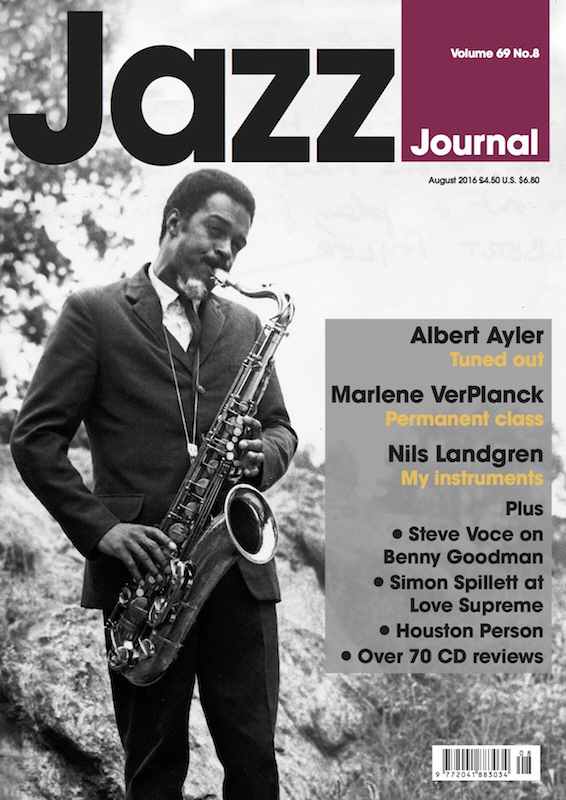 |
|||||||||||||
|
The August edition of Jazz Journal contains an article by Ronald Atkins about the infamous concert at the London School of Economics which was recorded by the BBC for its ‘Jazz Goes To College’ series but which they declined to broadcast. And, perhaps more infamously, the BBC later wiped the tapes. The concert, Ayler’s only appearance in the U.K., took place fifty years ago, on 15th November 1966, and further information about the concert, including Ronald Atkins’ original review in Jazz Monthly, is available in the Concert Reviews section. |
|||||||||||||
|
*** News from 2004 (January - June) 2004 (July - December) 2005 (January - May) 2005 (June - December) 2010 (January - June) 2010 (July - December) 2011 (January - May) 2011 (June - September) 2011 (October - December) 2012 (January - May) 2012 (June - December) 2013 (January - June) 2013 (July - September) 2013 (October - December) 2014 (January - June) 2014 (July - December) 2015 (January - May) 2015 (June - August) 2015 (September - December) 2016 (January - March) 2016 (April - June) 2016 (September - December) 2017 (January - May) 2017 (June - September) 2017 (October - December) 2018 (January - May) 2018 (June - September) 2018 (October - December) 2019 (January - May) 2019 (June - September) 2019 (October - December) 2020 (January - April) 2020 (May - August) 2020 (September - December) 2021 (January - March) 2021 (April - July) 2021 (August - December) 2022 (January - April) 2022 (May - August) 2022 (September - December) 2023 (January - March) 2023 (April - June) 2023 (July - September) 2023 (October - December) 2024 (January - March) 2024 (April - June) 2024 (July - September) 2024 (October - December)
|
|||||||||||||
|
Home Biography Discography The Music Archives Links What’s New Site Search
|
|||||||||||||
